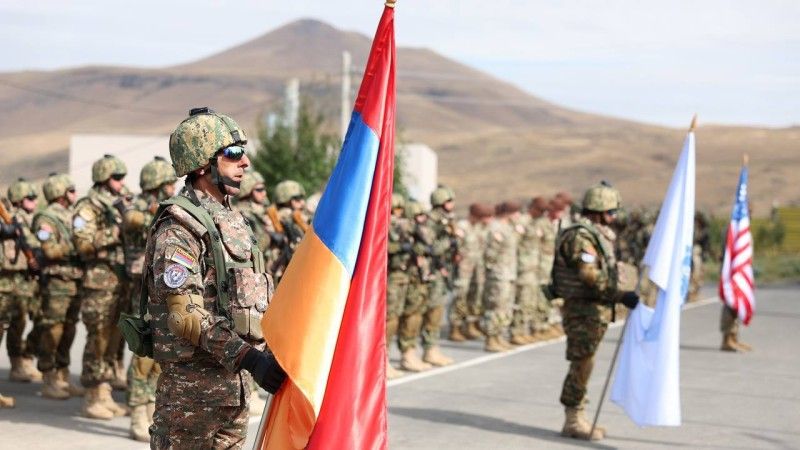Geopolitics
Yerevan: Depending solely on Russia for security was 'strategic mistake'

Photo. MoD of Armenia
The renewed increase in tension in the Caucasus region, as well as the continuing Russian aggression against Ukraine, have led to the undermining of Russia’s leadership position - also among its current allies. The biggest surprise may be the recent turn in the foreign policy of Armenia, previously considered a natural ally of Moscow.
However, it seems that the Kremlin's patience has been put to a real test in recent weeks. Armenian Prime Minister Nikol Pashinyan accused Russia of failing to ensure his country's security in the Nagorno-Karabakh region. He also expressed dissatisfaction with Russia's handling of the Lachin Corridor, suggesting that Moscow may lack the ability or desire to manage it effectively. In recent weeks, Yerevan has repeatedly accused Azerbaijan of massing armed forces in the disputed territory, which Baku has effectively blocked since December 2022, which has led to a significant deterioration of living conditions there and even the emergence of famine. In an interview with the Italian newspaper La Repubblica, Pashinyan said: "Armenia's security architecture was 99.99% dependent on Russia, including the supply of weapons and ammunition." Additionally, he noted that the policy of relying solely on Russia for security was a strategic mistake, which needs to be repaired.
It seems that Russia's aid capabilities have been effectively reduced as a result of the exhausting fighting on Ukrainian territory, as well as the subsequent sanctions against the aggressor. Thus, Russia is unable to meet Armenia's security needs even if it wanted to, mainly due to its own involvement in armed conflicts.
What is particularly important, Armenian political decision-makers for the first time negatively assessed their dependence on Russia, calling it a "strategic mistake". It cannot be ruled out that the West will try to take advantage of the damaged trust between these current partners. Recent events related to the Russian-Ukrainian conflict have affected not only these two countries, but also other regions of the world, including the Caucasus, whose political and economic position is still growing. In addition to the historical, cultural and energetic importance of the South Caucasus, its strategic and geopolitical location has made the region an arena of struggles for third-party influence. As in the past, it is attracting attention from opposing blocs, both internationally and regionally. For this reason, it can be assumed that the South Caucasus began to transform into a new arena of struggle between great powers. The awareness of Russia's weakening as a result of the "special operation" has influenced the adoption of a more decisive attitude by the countries of the collective West, which may try to turn the Armenian-Russian crisis into a success aimed at cutting off Russia from cooperation with other countries.
The Armenian Prime Minister admitted that Yerevan is currently trying to expand security partnerships. He also mentioned efforts to strengthen ties with the European Union, the United States and other countries in the region. In this context, the attention of international public opinion was drawn to the "Eagle Partner 2023" exercises, which the United States is conducting with Armenia on September 11-20 this year. Many countries, especially Russia, assessed the above-mentioned exercises as "a step that will not contribute to peace and tranquility in the region. Additionally, the Kremlin authorities issued a statement directly attacking Yerevan's interests, in which they announced that „The Armenian administration, under the document signed in Prague, recognized Azerbaijan's sovereignty over Karabakh. The Armenian administration announced that it recognized the borders of 1991 and recognized Karabakh as part of Azerbaijan", which is in opposition to the official position of the Armenians, who want to regain the previously lost territory.
The note from the Russian Ministry of Foreign Affairs also stated that Armenia's "political elites" have recently questioned bilateral relations with Russia and the principles of functioning of the Collective Security Treaty Organization (CSTO). Additionally, the Armenian ambassador in Moscow, Wagharshak Harutyunyan, was summoned to the Russian Ministry of Foreign Affairs, in order to hand him a protest note. The document indicates that the "offensive statements" by the Chairman of the National Assembly of Armenia - Alen Simonyan - made on September 6 this year against the spokeswoman of the Russian Ministry of Foreign Affairs, Maria Zakharova, and the entire Russian Ministry of Foreign Affairs were unacceptable. A separate statement also expressed concern about the detention on September 7 in Armenia of a blogger - M. Badalyan and a columnist of the Sputnik Armenia radio channel - A. Gevorgyan.
The visit of the wife of the Armenian Prime Minister, Anna Hakobyan, to Kiev also did not escape Russian attention. On September 6, Hakobyan took part in the Summit of First Ladies and Gentlemen. This event was organized for the first time by the First Lady of Ukraine – Olena Zelenska – in 2021. The Armenian was one of the speakers at the summit, along with the wives of the British Prime Minister and the President of Austria, the First Ladies of Albania, Cyprus and the Czech Republic. The fact that she arrived in Ukraine with humanitarian cargo did not go unnoticed. After returning to the country, she wrote on her Facebook that she had visited an exhibition dedicated to the memory of children who died in war: "Children dying in wars are a failure for all of us, adults. "An unforgivable, irreversible and irreplaceable failure," which further angered the Kremlin.
However, Yerevan's provocations did not end there. On the same day, the Speaker of the Armenian Parliament, Alen Simonyan, said that the Rome Statute would most likely be ratified. "We will discuss and understand what benefits there are, and there are many of them, because war crimes have been and are being committed against our country. We need this, our country needs this".
The Rome Statute is the international treaty establishing the International Criminal Court. Its creation was explained by the need for an independent court to resolve cases related to genocide, war crimes and crimes against humanity. March 17 this year The ICC has issued an arrest warrant for Vladimir Putin, accused of causing the illegal deportation of Ukrainian children. All countries that have ratified the treaty are obliged to extradite him if he is on their territory. If the document is ratified by Armenians, it will mean that the President of Russia will lose the right to travel safely within the territory of a country that for decades was considered a puppet in the hands of the Kremlin.
Although Moscow demanded explanations on this matter, Armenia's response was evasive. Deputy Speaker of the Parliament of Armenia - Hakob Arshakyan - said that the ratification of the document "is in no way directed against Russia, but will serve to prevent an attack by Azerbaijan on the sovereign territory of Armenia." Although the new rules will also cover issues directly related to the Armenian-Azerbaijani dispute, the timing of this topic's appearance in the political discourse may indicate an additional indirect goal, which is the desire to influence Russian decision-makers. It can therefore be assumed that Moscow's strategic mistake was to focus most of its attention on the Ukrainian front and ignore the situation in the Caucasus. It seems that Armenia has been under the influence of the Kremlin for so long that the Russians did not even entertain the thought that the country they had kept as a protectorate for years could break away from their control.
However, the possibility of a tension similar to the Russia-Ukraine conflict is currently unlikely - although theoretically possible - and Pashinyan may now try to play this card. It may seem that the US is showing Armenia the "NATO gate", just as it did towards Ukraine. However, the gestures coming from the West should not be overinterpreted. Closer cooperation does not mean an offer of membership in the North Atlantic Alliance, although Russian propaganda has already accused NATO of trying to include Armenia into its sphere of influence.
Ongoing crises in the region - both political and economic, growing social expectations and disturbing developments in international events have resulted in a gradual increase in pressure on Pashinyan. Considering the above, Yerevan seems to be slowly heading towards a paradigm shift. It can also be assumed that Russia will currently be passive in its reactions to the ongoing changes. Because the Russian-Ukrainian war has exhausted this country enough, Moscow will not open another battle front, at least for now. Instead, the Kremlin is likely to convey some warning signals to Armenia through the presence of Russian peacekeepers in the region. However, the existing connections between the two countries and their shared history should not be underestimated. In times of rising inflation, growing regional conflicts, as well as constant disputes over who should have the decisive voice in the international arena, an alliance with the "sick man of Europe" does not serve anyone. However, the country's geopolitical location does not favor sudden policy changes. The sudden loss of one protectorate without receiving replacement support may result in even greater losses during military clashes in the region. It should therefore be expected that Armenia's further foreign policy will depend on the outcome of the Russian-Ukrainian war and the place that Russia will take in the new international order.
